IEx (Interactive Elixir) is more than just a REPL (Read-Eval-Print Loop) —it’s your laboratory, debugger and exploration tool rolled into one.
Whether you’re learning Elixir, debugging production issues, or prototyping solutions, IEx is an indispensable part of the Elixir developer experience.
Starting Your IEx Journey
Launch IEx from your terminal:
$ iex
Erlang/OTP 25 [erts-13.0] [source] [64-bit] [smp:8:8]
Interactive Elixir (1.14.0) - press Ctrl+C to exit (type h() ENTER for help)
iex(1)>
Immediate Feedback Loop:
iex> 1 + 1
2
iex> String.reverse("elixir")
"rixile"
iex> Enum.map([1, 2, 3], &(&1 * 2))
[2, 4, 6]
IEx intelligently handles multi-line expressions:
iex> defmodule Greeter do
...> def hello(name) do
...> "Hello, #{name}!"
...> end
...> end
{:module, Greeter, <<70, 79, 82, ...>>, {:hello, 1}}
iex> Greeter.hello("World")
"Hello, World!"
Built-in Helpers
The h Helper - Your Documentation Companion
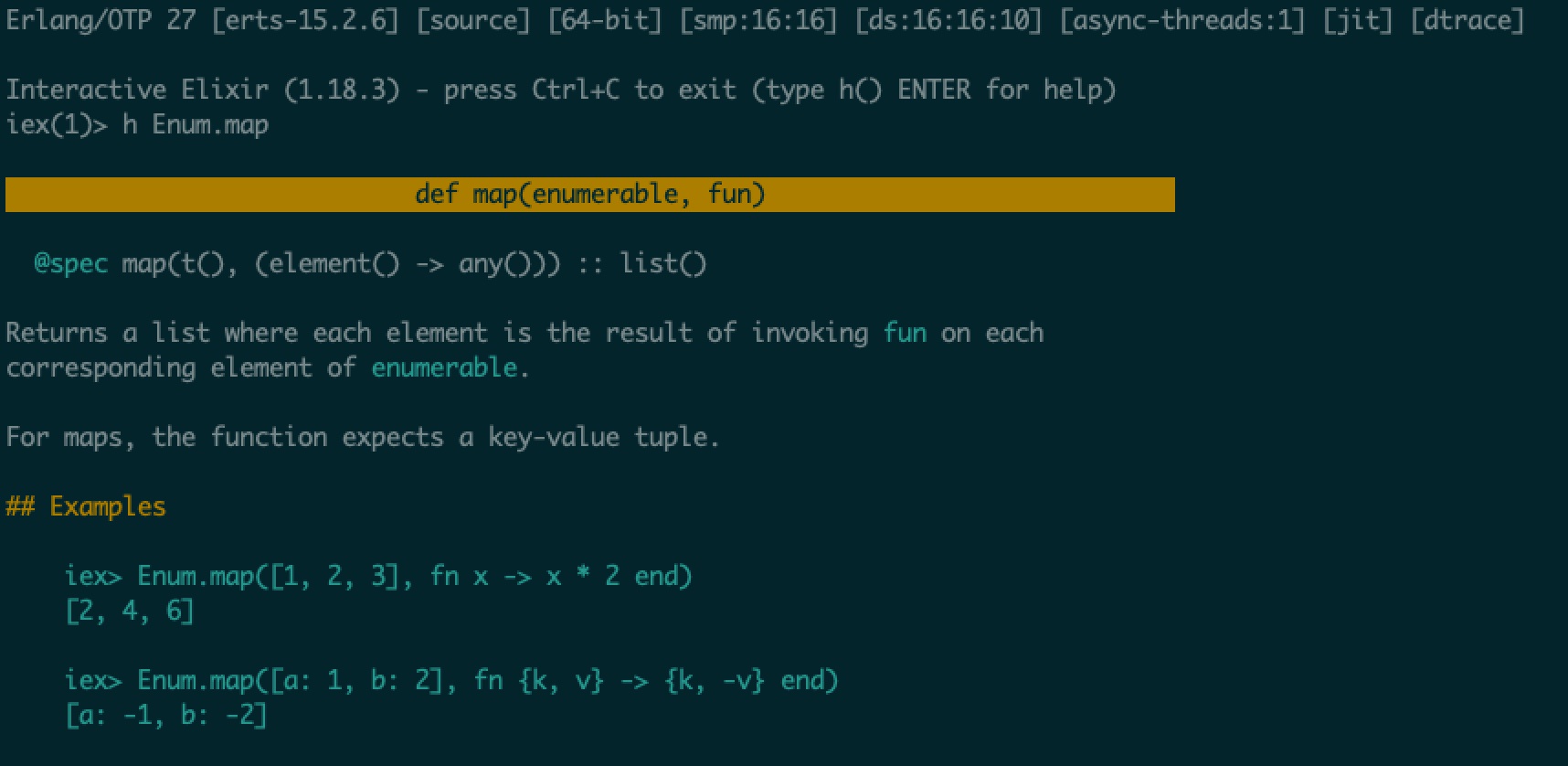
i - Inspect Any Value
iex> i "hello"
Term
"hello"
Data type
BitString
Byte size
5
Description
This is a string: a UTF-8 encoded binary...
or inspect module
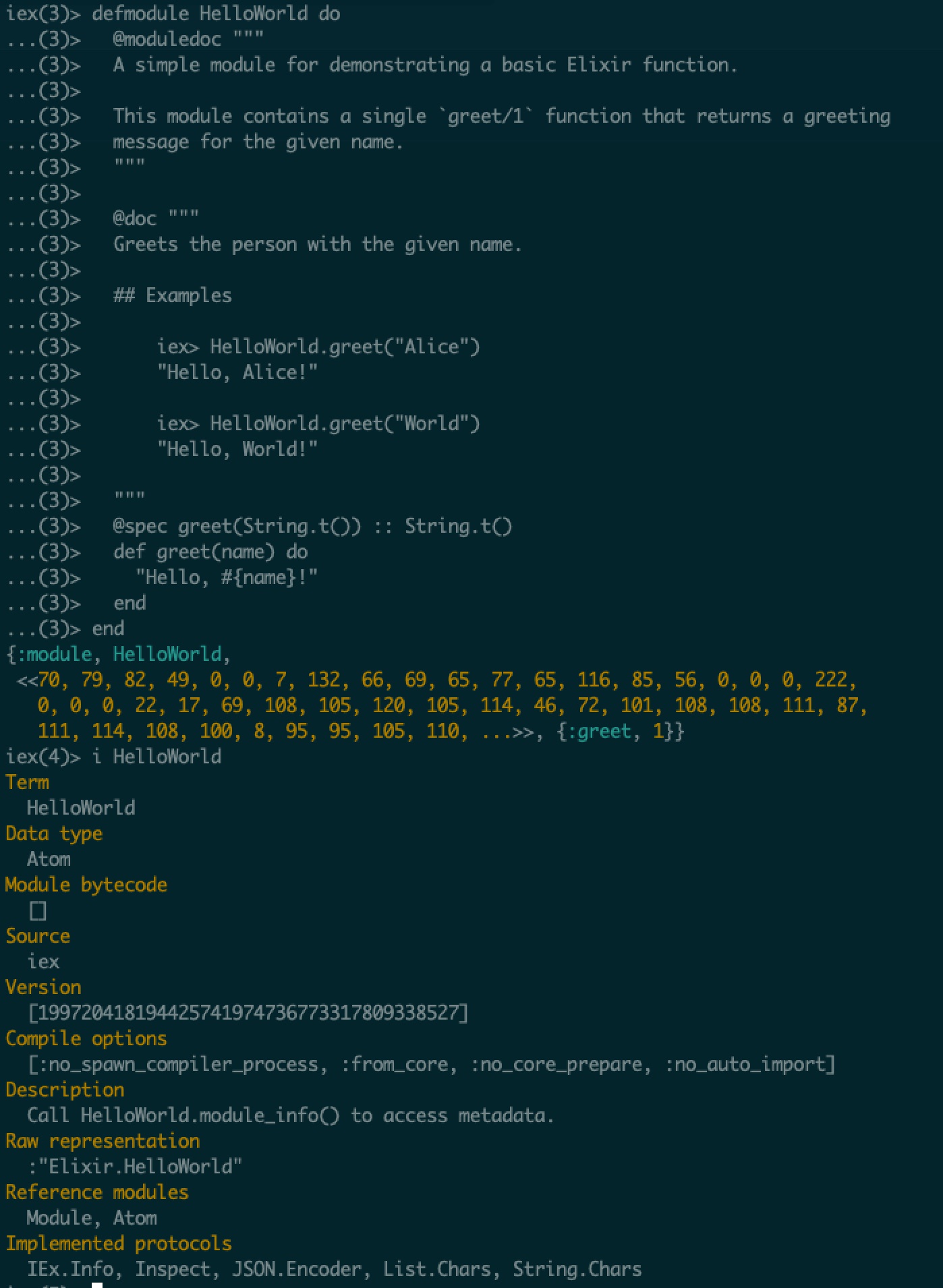
- which tells that
HelloWorldis anAtomand points to.module_info()
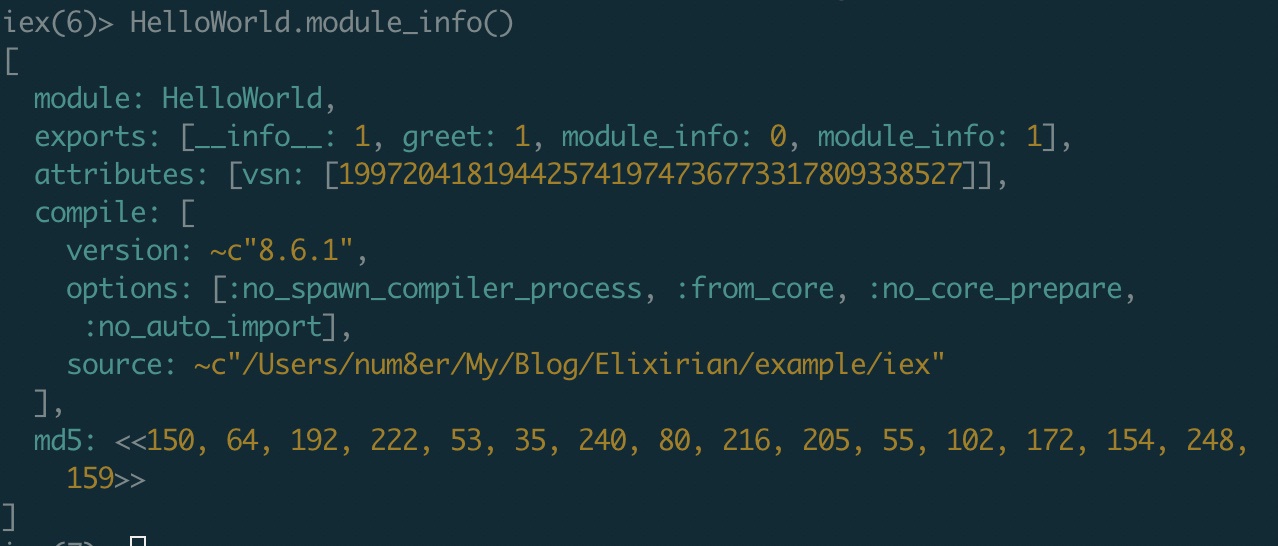
- which provides structured metadata about module
t - Type Information
iex> t Enum
@type t() :: Enumerable.t()
@type acc() :: any()
@type element() :: any()
b - Callbacks and Behaviors
iex> b GenServer
@callback init(init_arg :: term()) ::
{:ok, state}
| {:ok, state, timeout() | :hibernate | {:continue, continue_arg :: term()}}
| :ignore
| {:stop, reason :: any()}
when state: any()
v() - Accessing Previous Results
iex(1)> 10 * 10
100
iex(2)> 5 * 25
125
iex(3)> v() # Get last result
125
iex(4)> v(-1) # Same as above
125
iex(5)> v(1) # Get result from line 1
100
iex(6)> v(2) # Get result from line 2
125
iex(7)>sum = v(1) + v(2) # Use results from line 1 and 2
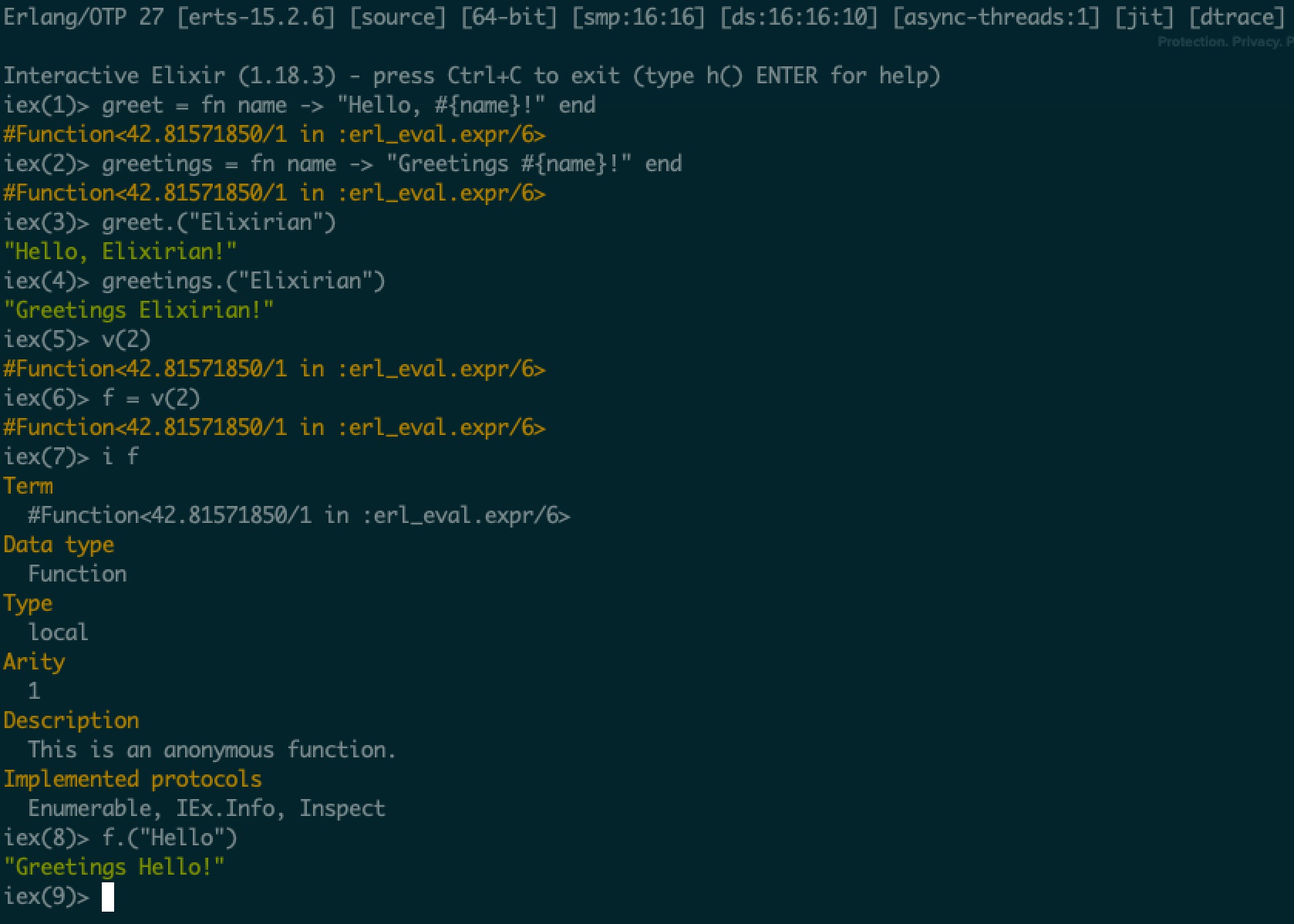
Shell History
# Navigate history with Up/Down arrows
# Search history with Ctrl+R (reverse search)
Recompiling Modules
iex> r MyModule
warning: redefining module MyModule
{:reloaded, MyModule, [MyModule]}
Debugging / Prying into Code
Add breakpoints in your code:
defmodule Calculator do
def complex_calculation(x, y) do
require IEx
IEx.pry()
result = x * y + 10
IEx.pry()
result / 2
end
end
When executed, IEx will pause at the pry point:
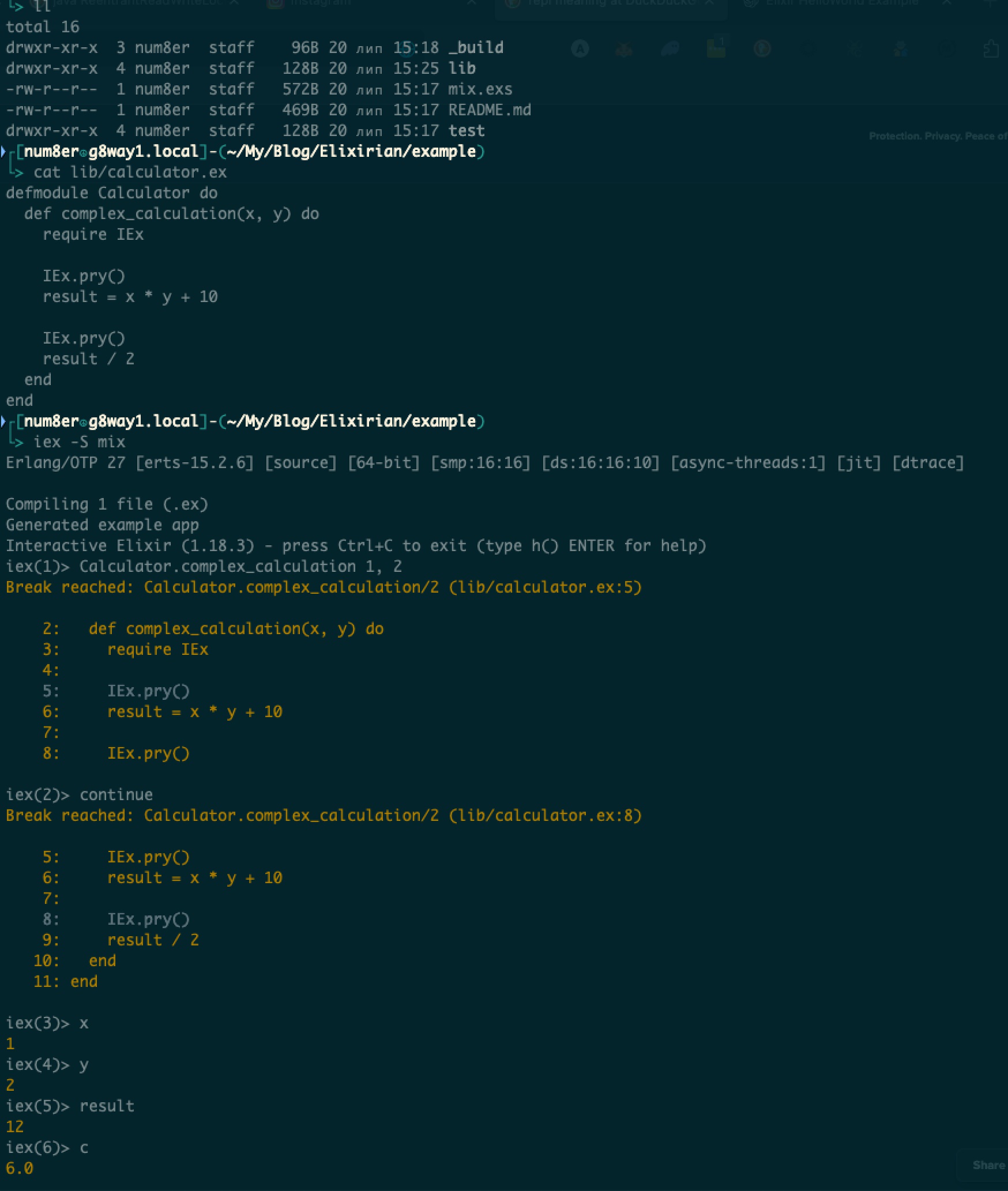
Runtime Inspection
# List all loaded modules
iex> :code.all_loaded()
# Get process info
iex> Process.info(self())
# See all processes
iex> Process.list()
IEx in Development Workflow
Testing Ideas Quickly
iex> users = [%{name: "Alice", age: 30}, %{name: "Bob", age: 25}]
iex> Enum.filter(users, & &1.age > 28)
[%{age: 30, name: "Alice"}]
Exploring External APIs
iex> {:ok, response} = HTTPoison.get("https://api.example.com/data")
iex> Jason.decode!(response.body)
Database Queries
iex> Repo.all(User)
iex> User |> where([u], u.age > 21) |> Repo.all()
IEx Tips and Tricks
1. Auto-completion
Press Tab for auto-completion:
iex> Enum.ma<TAB>
map map_every map_intersperse map_join map_reduce
2. Exiting IEx
Multiple ways to exit:
- Ctrl+C twice
- Ctrl+\
- System.halt()
- exit()
3. Shell Commands
Run shell commands with :os.cmd:
iex> :os.cmd('ls -la') |> to_string() |> IO.puts()
4. Loading Files
iex> c("path/to/file.ex") # Compile and load
iex> import_file("path/to/script.exs") # Run script
5. Benchmarking
iex> :timer.tc(fn -> Enum.sum(1..1_000_000) end)
{15834, 500000500000} # {microseconds, result}
IEx for Production Debugging
Observer - Visual System Inspection
iex> :observer.start()
This launches a GUI showing: - System overview - Application supervision trees - Process information - ETS tables - Memory usage
Tracing Function Calls
iex> :dbg.tracer()
iex> :dbg.p(:all, :c)
iex> :dbg.tpl(String, :upcase, [])
Common IEx Patterns
Creating Test Data
iex> users = for i <- 1..10, do: %{id: i, name: "User #{i}"}
iex> Enum.take_random(users, 3)
Quick Module Testing
iex> defmodule QuickTest do
...> def double(x), do: x * 2
...> end
iex> QuickTest.double(21)
42
Exploring Libraries
iex> h Phoenix.Router
iex> exports Phoenix.Router
Conclusion
IEx transforms the development experience from write-compile-run cycles to immediate, interactive exploration. It’s not just a REPL—it’s your companion for:
- Learning and experimenting
- Debugging and troubleshooting
- Testing and prototyping
- Production system inspection
- Interactive documentation browsing
Master IEx, and you’ll find yourself more productive, gaining deeper insights into your code and the Elixir ecosystem.
Whether you’re a beginner exploring syntax or an expert debugging distributed systems, IEx has tools to help you succeed.
When in doubt, fire up IEx and experiment.
The immediate feedback loop accelerates learning and problem-solving like nothing else.
